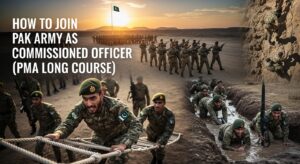Forces recruitment in Pakistan is a journey that demands precision, preparation, and a clear understanding of each step. The process begins with identifying the right recruitment category, whether you are targeting a soldier, officer, or a specialized role. Each category comes with its own set of eligibility requirements, including age, education, and physical standards.
Applicants must ensure they meet these criteria before proceeding, as this initial step is crucial for a successful application. By clarifying eligibility early, candidates can avoid unnecessary setbacks and focus their efforts on the right opportunities.
Once eligibility is confirmed, the next phase centers on meticulous document preparation. This involves gathering original and attested copies of essential documents such as the Computerized National Identity Card (CNIC), domicile certificate, educational certificates, and recent passport-size photographs.
For those with unique circumstances, such as children of serving or retired military personnel or current government employees, additional supporting documents like discharge book copies or No Objection Certificates are required. Every photocopy must be attested by an authorized official, and organizing these documents in a systematic manner is key to a smooth verification process at recruitment centers. Attention to detail at this stage helps prevent common issues like document rejection or delays due to incomplete paperwork.
The final stages of the process focus on application submission, testing, and diligent follow-up. Candidates must complete the online registration accurately, upload all required documents, and print the application form and registration slip. Visiting the nearest Army Selection and Recruitment Center with all documents in hand is essential for verification and further instructions.
After document verification, candidates undergo written, physical, and medical tests, each requiring thorough preparation. Staying updated on deadlines, test dates, and result announcements is vital, as missing any step can jeopardize the entire application. By following a structured approach, maintaining organized records, and preparing both physically and mentally, applicants can maximize their chances of success in the highly competitive forces recruitment process in Pakistan.
Step 1: Understand the Forces Recruitment Eligibility Criteria
Before you start gathering documents, it is crucial to clearly identify the type of recruitment you are applying for, as document requirements and eligibility vary significantly:
- Soldier (Sipahi) Recruitment: Requires minimum education of matriculation (10th grade) or sometimes 8th grade for specific regions/trades.
- Officer Commission (e.g., PMA Long Course): Requires intermediate level education (F.Sc or equivalent) or higher.
- Specialized Posts: Such as medical officers, engineers, nursing staff, or technical cadets have additional educational and professional requirements.
- Paramilitary and Civilian Posts: May have their own set of criteria.
Eligibility basics:
- Age: Generally 17-23 years for soldiers; some relaxations for graduates, drivers, or specific regions (e.g., Balochistan).
- Nationality: Pakistani citizen with valid domicile.
- Marital Status: Usually unmarried for initial recruitment.
- Physical Standards: Minimum height, weight, and chest measurements vary by category and region.
Step 2: Collect Basic Identification Documents
These are mandatory for all applicants and form the foundation of your application. Photocopies must be attested by a government gazetted officer or magistrate. This means the officer signs and stamps your photocopies confirming their authenticity. Always carry originals for verification at recruitment centers and keep multiple attested photocopies ready to avoid delays.
- Computerized National Identity Card (CNIC):
- Must be original and valid.
- Old NICs or expired cards are not accepted.
- If underage, a Form-B can be used temporarily but must be replaced by CNIC before final selection.
- Bring two attested photocopies of your CNIC as well.
- Father’s or Guardian’s CNIC:
- Original and attested photocopy required to establish family linkage.
- Domicile Certificate:
- Original domicile certificate of your district or province.
- Two attested photocopies needed.
- This proves your legal residence and eligibility for regional quotas.
Step 3: Prepare Educational Certificates and Mark Sheets
Your educational qualifications must be proven with original certificates and mark sheets.
- Soldiers: Matriculation certificate (10th grade) with mark sheet.
- Officers: Intermediate certificate (F.Sc or equivalent) with detailed marks.
- Specialized roles: Graduation, professional diplomas, or degrees (e.g., MBBS, engineering) along with registration certificates if applicable.
Bring original certificates and two attested photocopies of each. If you have multiple educational qualifications, bring all relevant documents. For medical or technical posts, bring professional registration certificates (e.g., PMDC for doctors) and house job certificates if completed.
Step 4: Obtain Recent Passport-Size Photographs
- Prepare at least four recent passport-size photos with a white background.
- Photos should be professionally taken, clear, and in formal attire (no casual clothes).
- Some recruitment centers specify photo size and format; verify from the official instructions before printing.
Step 5: Collect Additional Supporting Documents (If Applicable)
- Discharge Book Photocopy: For children of retired military personnel.
- Service Certificate or Letter from Unit Commander: For children of serving military personnel.
- No Objection Certificate (NOC): If you are currently employed in a government department, you must obtain official permission to apply.
- Driving License: If applying for driver posts, bring original and attested photocopies.
- Bond or Undertaking: Some posts require signing a service bond after selection.
Step 6: Attestation and Verification of Documents
- All photocopies must be attested by a government official (gazetted officer, magistrate, or recruitment center officer).
- Originals are needed for verification but will be returned immediately.
- Ensure no document is expired, damaged, or altered.
- Keep documents organized in a file or folder to present neatly.
Step 7: Complete the Application Form and Online Registration
- Visit the official recruitment portal: www.joinpakarmy.gov.pk
- Register an account and fill out the application form carefully with accurate details.
- Upload scanned copies of required documents as per instructions.
- Print the filled application form and registration slip.
- For some posts, offline forms may be accepted at Army Selection and Recruitment Centers (AS&RC).
Step 8: Visit the Army Selection and Recruitment Center (AS&RC)
- Locate the nearest AS&RC in cities like Rawalpindi, Lahore, Karachi, Peshawar, Quetta, Multan, Hyderabad, or Gilgit.
- Bring all original documents, attested photocopies, application form, and registration slip.
- Submit your documents for verification.
- You may be asked to fill additional forms or provide biometric data.
- Obtain an acknowledgment receipt for your submission.
Step 9: Prepare for Written, Physical, and Medical Tests
- Written tests cover general knowledge, intelligence, and academic subjects.
- Physical tests include running, push-ups, sit-ups, and other fitness evaluations.
- Medical examination ensures you meet health standards.
- Bring your CNIC and application receipt to test centers.
Step 10: Follow Up and Stay Updated
- Keep track of test dates, results, and further instructions via official websites or recruitment centers.
- Deadlines are strict; late submissions are not entertained.
- After passing initial tests, you may be called for ISSB (Inter Services Selection Board) tests for officers or further evaluations for soldiers.
Common Issues and How to Troubleshoot Them Effectively
| Problem / Issue | Troubleshooting |
|---|---|
| Missing attestation, expired CNIC, or incomplete educational certificates | Double-check all documents before submission. Get photocopies attested only by authorized officers. Renew your CNIC in advance if near expiry. Contact your school or board early to obtain original certificates or mark sheets. |
| Website glitches, wrong information entry, or failure to upload documents | Use a stable internet connection and updated browser. Fill forms carefully; keep a copy of your data before submission. Scan documents clearly and in the required format (PDF or JPEG). If stuck, visit the nearest AS&RC or call official helpline numbers. |
| Difficulty finding a gazetted officer or confusion about attestation | Visit local government offices, NADRA centers, or police stations where attestation is offered. Some recruitment centers provide attestation services; inquire beforehand. Avoid attestation by unauthorized persons to prevent rejection. |
| Not meeting height, weight, chest, or fitness standards; medical disqualifications | Prepare physically in advance with running, strength exercises, and endurance training. Maintain a balanced diet and healthy lifestyle. Consult a doctor for any medical issues before tests. Understand the exact physical standards required for your category. |
| Mismatches or errors in names, dates, or details | Ensure all spellings and details match exactly across documents. Carry original documents for cross-checking. If errors exist, get corrected certificates from the issuing authority before applying. |
| Missing application or test deadlines due to lack of information | Regularly check the official Pakistan Army website and recruitment portals. Subscribe to official notifications or follow recruitment centers on social media. Keep a personal calendar with all important dates. |
| Applying without meeting age, education, or physical criteria | Carefully read official eligibility criteria before applying. If in doubt, contact recruitment centers or official helplines for clarification. Avoid wasting effort on ineligible posts. |
Final Notes
- Always keep multiple sets of attested photocopies and originals organized neatly.
- Be honest and accurate in your application; any false information can lead to disqualification.
- Prepare physically and mentally for tests and interviews.
- Use official resources and websites for the most reliable information.
- Stay patient and persistent; the recruitment process is competitive and thorough.
This detailed guide aims to ensure you have everything you need to confidently navigate the Pakistan armed forces recruitment process without missing any critical steps or documents.











